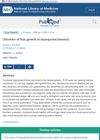 19 citations
,
January 2012 in “Dermato-endocrinology”
19 citations
,
January 2012 in “Dermato-endocrinology” Moderately high prolactin levels do not cause hair loss in women.
 14 citations
,
January 1990 in “Fertility and Sterility”
14 citations
,
January 1990 in “Fertility and Sterility” Some patients with high prolactin levels don't show symptoms because they have a form of the hormone that's less active.
11 citations
,
March 1991 in “PubMed” Hormonal imbalances, including high prolactin and thyroid issues, contribute to hair growth problems in women.
 3 citations
,
January 1988 in “PubMed”
3 citations
,
January 1988 in “PubMed” High prolactin levels can cause skin and hair symptoms similar to those caused by hormone imbalances.
2 citations
,
January 1989 in “PubMed” Hypothyroidism and hyperprolactinemia may cause hair loss in women.



